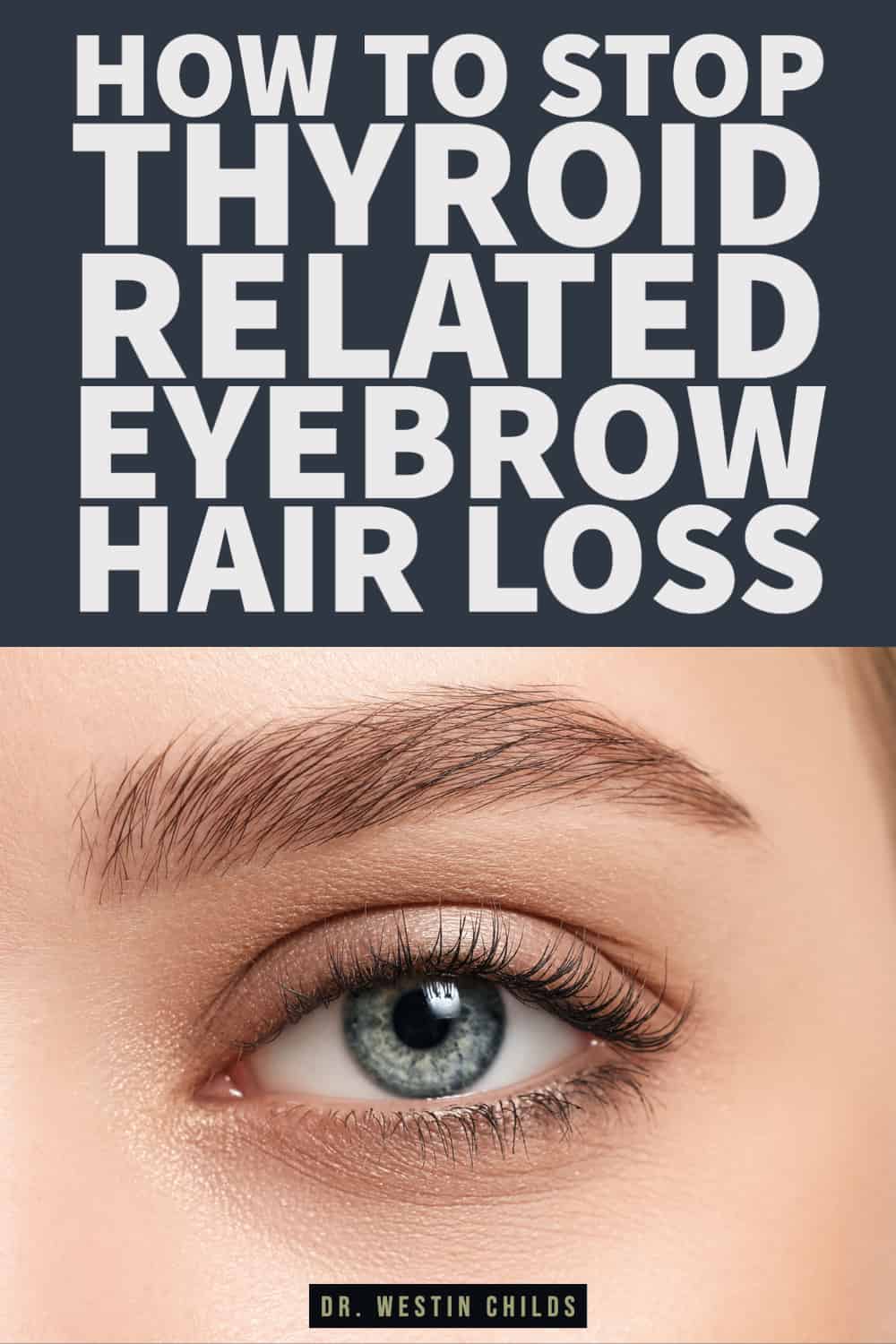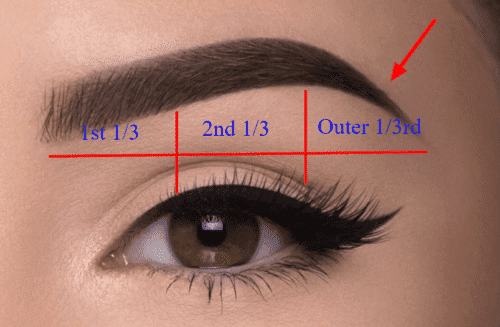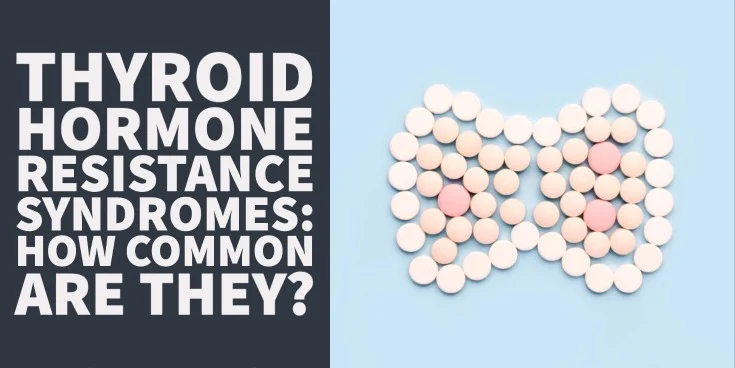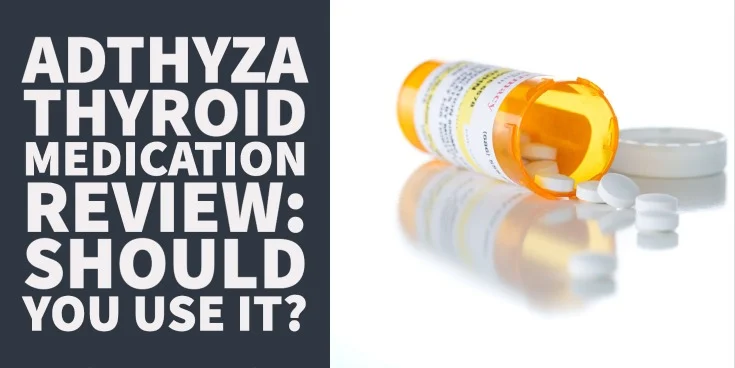Does thyroid disease lead to eyebrow hair loss?
The answer is definitely yes.
If you have thyroid problems (such as hypothyroidism) then chances are high that you might also be suffering from eyebrow hair loss.
One big issue with eyebrow hair loss is that this symptom can persist even though you are taking thyroid medication!
With that in mind, I want to talk about the reasons that thyroid causes eyebrow hair loss and, more importantly, what you can do about it.
Eyebrow Hair Loss is Tied to Thyroid Function
In case you didn’t know, eyebrow hair loss is one of the principal side effects of hypothyroidism.
Hypothyroidism is defined as a state of low thyroid function and occurs when your body can’t produce enough thyroid hormone.
When this happens, your hair follicles aren’t stimulated as much as they should be and your hair both stops growing and starts falling out.
This occurs with the hair on your head and with the hair on your eyebrows!
In fact, hair loss is one of the earliest signs and symptoms of thyroid disease.
Why?
Because your body would rather keep thyroid hormone for vital organs and cellular functions instead of helping your hair grow.
Because of this, eyebrow hair loss is very common among thyroid patients (1).
The typical eyebrow hair loss distribution is on the outer 1/3 of the eyebrow as in the picture below:
The outer 1/3 of the eyebrow is also the place where the ‘tail’ of your eyebrow is located.
Hair loss, especially if it is located in this area is highly suggestive of hypothyroidism!
If you are experiencing diffuse hair loss all over your eyebrow then your hair loss may or may not be related to your thyroid function.
So now that you know what to look for, let’s talk about what you can actually do about it.
DOWNLOAD FREE RESOURCES
Foods to Avoid if you Have Thyroid Problems:
I’ve found that these 10 foods cause the most problems for thyroid patients. Learn which foods you should avoid if you have thyroid disease of any type.
The Complete List of Thyroid Lab tests:
The list includes optimal ranges, normal ranges, and the complete list of tests you need to diagnose and manage thyroid disease correctly!
How to Grow Back Your Eyebrows
#1. Take thyroid medication! (If necessary)
The first thing to consider is the use of thyroid medication.
Thyroid medication is the treatment of choice for anyone suffering from hypothyroidism in any of its forms.
Thyroid medication contains active thyroid hormones (such as T4 and T3) which can provide your body with whatever amount of thyroid you aren’t able to produce naturally.
The reason for eyebrow hair loss in thyroid disease is directly related to the concentration of thyroid hormone interacting with your hair follicles (2).
Smaller amounts of circulating thyroid hormone mean fewer thyroid hormone interactions on your hair follicles which means potentially more hair loss.
Taking thyroid medication provides your body with the hormone that you need and may help to stimulate eyebrow hair growth.
Be patient though, especially if you are just starting thyroid medication!
It can take weeks or months for your eyebrows to start to grow back but during this process, you should notice a reduction in eyebrow hair loss.
#2. Ensure that your thyroid medication is actually working.
What if you are already taking thyroid medication but still experiencing eyebrow hair loss?
Don’t worry, this is actually a fairly common occurrence and a scenario that many people find themselves in.
If you fit into this category it means that the medication you are taking is probably not sufficient for YOUR body.
Consider this:
When you take thyroid hormone you are trying to provide your body with the exact amount of thyroid hormone that you aren’t able to produce naturally.
So, let’s say that your thyroid is functioning at about 70% of normal.
Because your body knows that your eyebrows are not ‘vital’ to everyday living, it’s probably not going to allocate thyroid hormone for them until you get very close to 100% thyroid function.
But what if you are taking thyroid medication but you are only approaching 90% of the missing thyroid hormone in your body?
This creates a scenario in which you may be taking thyroid hormone but still experiencing hair loss due to the fact that you aren’t getting enough.
You can optimize your thyroid medication dose to further improve hair growth by looking at free T3 and total T3.
These lab tests should be in the top 30% of the reference range, and if they aren’t it may explain your hair loss.
If your doctor isn’t willing to manipulate your medication dose then you may need to look at other options such as hair-regrowth supplements or thyroid-enhancing supplements.
You can also use this resource to try and find a doctor who is more open-minded and who is more willing to work with you!
#3. Take hair regrowth supplements (this works for both your hair and eyebrows).
Another option to help re-grow your eyebrows is to use hair regrowth supplements.
I’m not talking about the run-of-the-mill hair, skin, and nail supplements (those may work), but instead, I’m talking about nutrients that are required for hair growth.
Nutrients that fit this category provide the necessary precursors so your own body can create collagen and elastin which are vital to hair growth.
Some of the best nutrients for doing this include biotin, silicon, and choline (3).
These nutrients help to form protein complexes in the hair which give the hair strength and the potential for growth.
Taking these nutrients can actually help your hair grow back (including both the hair on your head and your eyebrow hair) even if you aren’t deficient in them.

Other nutrient deficiencies, such as protein deficiency, can also lead to hair loss, though this is less common due to the widespread use of protein powders and collagen.
I’ve found that people who suffer from thyroid hair loss tend to respond very well to the combination of silicon, choline, and biotin.
Just realize that these types of supplements may not be able to fix your eyebrow hair loss 100% unless you also address underlying thyroid function (either with medications or with supplements).
#4. Take thyroid-enhancing supplements
We talked a little bit about hair regrowth supplements so now I want to spend some time on thyroid-enhancing supplements.
Thyroid-enhancing supplements contain very different ingredients when compared to hair growth supplements.
The goal when using thyroid-boosting supplements is to help your thyroid function on its own by providing your body with all of the vital and necessary nutrients required for thyroid function.
Nutrients such as vitamin A, vitamin D, B vitamins, zinc, and selenium are all required for your body to create and activate thyroid hormones.
A deficiency in any of these nutrients may result in sub-optimal thyroid function, even while using thyroid medications!
These supplements don’t directly help with hair loss but they can indirectly help with thyroid-related hair loss through their influence on thyroid function.
In most cases, I find that people have the most success when they combine supplements designed to promote hair growth with supplements designed to enhance thyroid function.
By combining these two types of supplements together you can hit your hair loss from both ends.
If you are looking for a thyroid-enhancing supplement then make sure you find one which contains zinc, selenium, and guggul because these nutrients not only help with thyroid production but also with thyroid conversion.
#5. Look at your iron/ferritin
Another very important nutrient that shouldn’t be overlooked is iron.
Iron is perhaps just as important if not more important than your thyroid function (4) when it comes to determining if your hair can grow or not.
Ever wonder why so many women swear by using pre-natal vitamins for hair loss?
It’s because these vitamins often contain iron!
And, because women have menstrual cycles they are often mildly iron deficient.
This, in combination with hypothyroidism, sets the stage for both eyebrow hair loss and generalized hair loss.
The good news is that this is probably the easiest problem to have because it is readily treatable with iron.
You want to be careful before you jump into using iron, however.
Overusing iron can cause problems, so you only want to supplement with it if you are deficient.
You can easily test for the deficiency by looking at your serum iron studies and by ordering a test known as ferritin.
If hair regrowth is your goal then you want your ferritin to be around 60 ng/mL (5).

The image above shows a fairly typical example of someone who has low ferritin.
You can see the reference range is from 10 to 154 ng/mL.
A minimal level of 60 ng/mL is ideal for hair growth and you can take iron supplements to help you get there.
#6. Consider switching thyroid medications
Last, but not least, is the influence that thyroid medication has on your hair.
It may surprise you to know that some thyroid medications can actually cause hair loss!
Obviously, this isn’t ideal if you are already suffering from thyroid-related hair loss but it is something that you should be aware of.
You also need to understand that just because thyroid medication can sometimes cause hair loss doesn’t mean that it will ALWAYS cause hair loss.
Understanding this is very important because switching thyroid medications may be the answer to your current hair loss.
It can really be difficult to tease out what is actually causing hair loss if you have thyroid disease because several conditions can cause it including:
- Your medication itself.
- The state of not using enough medication.
- Using too much medication.
All of these scenarios can lead to hair loss and each one is treated slightly differently.
If you have normal ferritin and if your thyroid is optimized (through lab testing) but you are still experiencing eyebrow hair loss, then it may be time to consider switching your medication.
I tend to prefer the use of ‘cleaner’ thyroid medications which contain few inactive ingredients.
Medications on this list include Tirosint, WP thyroid, and NP Thyroid.
Other Causes of Eyebrow Hair Loss
Another important point to remember is that not all eyebrow hair loss is caused by your thyroid!
In fact, it’s possible for you to suffer from eyebrow hair loss related to some other condition even if you also have thyroid issues.
Other conditions which can lead to eyebrow hair loss include:
- Autoimmune disease (6)
- Genetic hair loss conditions
- Infections of the skin (7)
- Hypersensitivity reactions to topical ointments, makeup, lotions, gels, etc.
- Stress (8)
- Protein deficiency (9)
- Calorie deficiency from dieting
- Excess vitamin A
- Certain prescription medications (testosterone, beta-blockers, blood thinners, and topical retinoids) (10)
- Acne, rosacea, or psoriasis
These conditions are not necessarily common, but they may be contributing to your hair loss in some way.
Try to avoid ‘thyroid tunnel vision’ when dealing with hair loss and just be aware that other things can cause it too.
Conclusion
Dealing with eyebrow hair loss can be an extremely frustrating thing, especially if you have thyroid disease.
The good news is that it is definitely possible to not only stop eyebrow hair loss but to also regrow your lost hair.
In order to do this, though, you will need to pay special attention to your thyroid function, which medications you are using, and which supplements you are taking.
Start with these issues and then go to other potential causes of eyebrow hair loss if you can’t find success.
As you go down the list of potential causes you will eventually find what is going on in your body and you will be able to deal with it.
Don’t stop, even if you can’t find the answers right away! It may take time but you will get there.
Now I want to hear from you:
Are you suffering from hair loss related to your thyroid?
What have you done to try and regrow your eyebrows back?
What has worked for you? What hasn’t?
Leave your questions or comments below!
Scientific References
#1. https://www.ncbi.nlm.nih.gov/pmc/articles/PMC3746235/
#2. https://www.ncbi.nlm.nih.gov/pmc/articles/PMC4454174/
#3. https://www.ncbi.nlm.nih.gov/pmc/articles/PMC3509882/
#4. https://www.ncbi.nlm.nih.gov/pubmed/23428658
#5. https://www.ncbi.nlm.nih.gov/pmc/articles/PMC3678013/
#6. https://www.ncbi.nlm.nih.gov/pubmed/24151515
#7. https://www.ncbi.nlm.nih.gov/pmc/articles/PMC3358936/
#8. https://www.ncbi.nlm.nih.gov/pmc/articles/PMC1868107/
#9. https://www.ncbi.nlm.nih.gov/pmc/articles/PMC5315033/
#10. https://www.ncbi.nlm.nih.gov/pubmed/8018303









